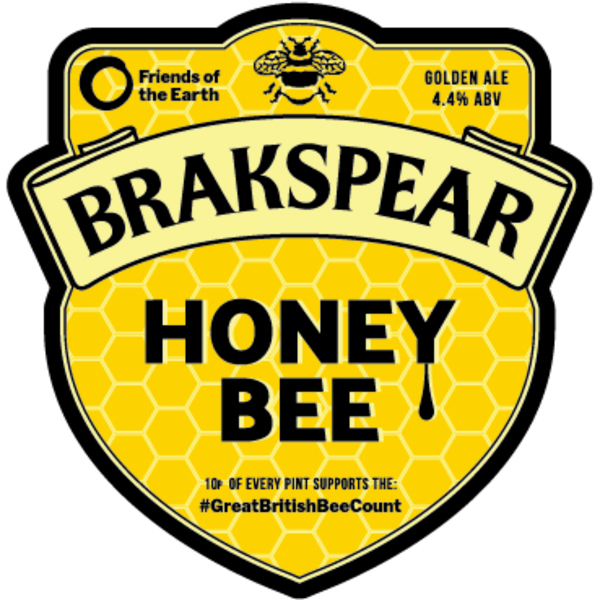Bee happy with Brakspear Honey Beer
Added: Monday, April 30th 2018

Britain's under-threat bees are being offered a lifeline by Henley brewer and pub operator Brakspear, whose Honey Bee beer, available throughout May, will raise money for Friends of the Earth’s Bee Cause campaign.
Honey Bee, a 4.4% honey beer, is back by popular demand for a third year. Every pint sold will raise 10 pence for the Bee Cause, the campaign to protect our declining bee populations. Last year, Brakspear presented a cheque for £2,890 to the charity.
Created by Brakspear head brewer Malcolm Mayo, Honey Bee was originally brewed in 2015 at Brakspear’s Bell Street Brewery in Henley, but has moved to the larger Wychwood Brewery in Witney to meet growing demand. It is brewed using Maris Otter and crystal malts as well as malted oats, First Gold and Willamette hops and has delicate, subtle honey notes, with a bracing delivery of hops on the follow through.
As well as selling Honey Bee, Brakspear pubs are supporting bees by encouraging customers to join in the Great British Bee Count (www.GreatBritishBeeCount.co.uk) from 17 May-30 June. This initiative by Friends of the Earth, sponsored by Ecotalk, encourages the public to do some bee-spotting with a free smartphone app – and provides lots of advice on what we can all do to help these precious, but under-threat, pollinators.
Brakspear pubs selling Honey Bee will be featured on an online map on the Friends of the Earth website, encouraging supporters of the Bee Cause to try the beer in a pub near them.
Brakspear chief executive Tom Davies said :“We’re delighted to be supporting the Bee Cause again. It’s a cause that our licensees and customers are keen to support, as reflected in the growing demand for Honey Bee.
“Our partnership with Friends of the Earth started in 2014, when many of our pubs started to plant bee-friendly flowers and shrubs and continued with the launch of Honey Bee, a perfect beer for sipping in a pub garden or patio.
“Supporting Friends of the Earth’s Bee Cause is a natural choice for Brakspear. We have a bee in our logo, and some of the finest pub gardens in the region, which rely on bees to pollinate the plants and shrubs that make them so attractive. We’re confident sales of Honey Bee will help us to once again make a good contribution to the Bee Cause.”
Friends of the Earth chief executive Craig Bennett said: “We’re extremely grateful to Brakspear for their fabulous support for our Bee Cause Campaign, and their tremendous efforts in raising awareness of the plight of our humble bees.
“People can enjoy a pint of Honey Bee and know they are helping these precious pollinators, which are currently facing enormous threats, such as habitat loss,pesticide-use and climate change.”
Brakspear’s partnership with Friends of the Earth will help to raise awareness of the threats facing these bees and encourage the public to be part of the generation that saves them. As well as the honey bee, Britain is home to around 225 species of solitary bee and 26 bumblebees.
Bee Cause is Friends of the Earth’s campaign to protect bees. Bees have lost 90 per cent of their natural habitat over the past 60 years. 13 species of bees have disappeared from the UK since 1900, with 35 officially under threat of extinction. Worldwide, bees and other pollinating insects pollinate 75 per centy of our main food crops and scientists estimate it would cost £1.8 billion per year to pollinate UK crops by hand. More at https://friendsoftheearth.uk/bees
The bee on the Brakspear logo has its roots in a centuries-old connection to Nicholas Breakspear, the only English Pope and a distant relative of the Brakspear family. Elected as Pope Adrian IV in 1154, his papal seal included a bee, apparently as a reminder of the ‘B’ at the beginning of his name.
Easy ways to help bees
- 1. Grow bee-friendly plants - through the seasons
Bees visit plants for their nectar and pollen, and may visit a plant for one or both of these. Different bee species prefer different flower shapes, so aim for a range from tubular-shaped flowers like snapdragons and honeysuckle, to open-headed flowers like sunflowers, yarrow and fleabane. It’s not just flowers like these that bees love – try shrubs, herbs, trees (cherry, goat willow) and fruit and veg (beans, peas, peppers, raspberries) too. Spring and autumn flowering bulbs like crocus are also great.
friendsoftheearth.uk/bees/bee-friendly-plants-every-season
- 2. Short of space?
Even if you don’t have a garden or much space, a few plants in a window box or pots will all help bees. Try lavender, heathers, nasturtiums, sunflowers and bulbs like crocuses
- 3. Enjoy fresh herbs
Herbs provide a valuable source of food for bees – and great flavours for your cooking. Chives, sage, marjoram, mint and thyme are great if you have limited space.
- 4. Learn to love a few weeds
If you have a lawn, leave some dandelions and clover to flower for the bees. A ‘messy corner’ with a pile of old wood and leaves will help bees and bring other wildlife too.
- 5. Avoid using pesticides
Help wildlife thrive by putting away the chemical pesticides, especially those containing bee-harming neonicotinoid pesticides.
- 6. Buying a gift?
Bee-friendly plants or a bee hotel make a lovely gift. How about a patio fruit tree like a crab apple or cherry (wild, sour, bird or plum cherries) for a special anniversary? Strawberries and blueberries are great for young children.








